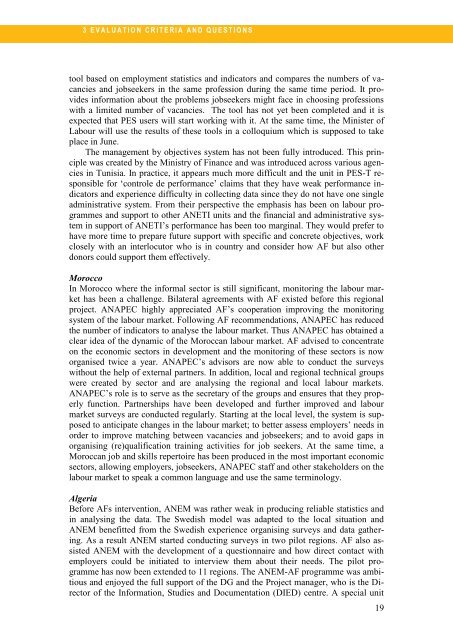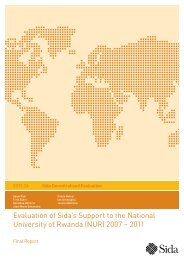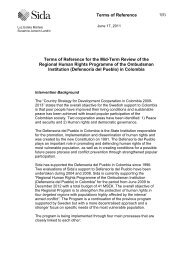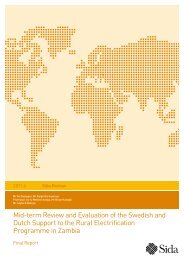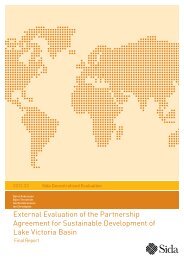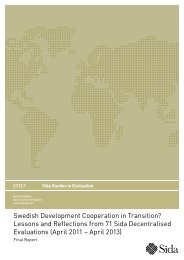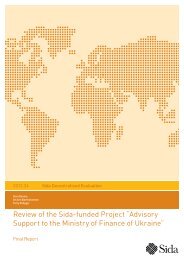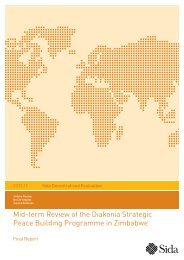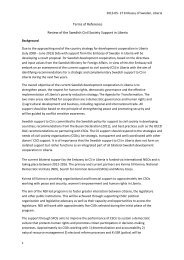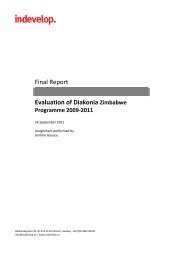Evaluation of the Maghreb Regional Training Programme - Indevelop
Evaluation of the Maghreb Regional Training Programme - Indevelop
Evaluation of the Maghreb Regional Training Programme - Indevelop
Create successful ePaper yourself
Turn your PDF publications into a flip-book with our unique Google optimized e-Paper software.
e<br />
3 E V A L U A T I O N C R I T E R I A A N D Q U E S T I O N S<br />
tool based on employment statistics and indicators and compares <strong>the</strong> numbers <strong>of</strong> vacancies<br />
and jobseekers in <strong>the</strong> same pr<strong>of</strong>ession during <strong>the</strong> same time period. It provides<br />
information about <strong>the</strong> problems jobseekers might face in choosing pr<strong>of</strong>essions<br />
with a limited number <strong>of</strong> vacancies. The tool has not yet been completed and it is<br />
expected that PES users will start working with it. At <strong>the</strong> same time, <strong>the</strong> Minister <strong>of</strong><br />
Labour will use <strong>the</strong> results <strong>of</strong> <strong>the</strong>se tools in a colloquium which is supposed to take<br />
place in June.<br />
The management by objectives system has not been fully introduced. This principle<br />
was created by <strong>the</strong> Ministry <strong>of</strong> Finance and was introduced across various agencies<br />
in Tunisia. In practice, it appears much more difficult and <strong>the</strong> unit in PES-T responsible<br />
for ‘controle de performance’ claims that <strong>the</strong>y have weak performance indicators<br />
and experience difficulty in collecting data since <strong>the</strong>y do not have one single<br />
administrative system. From <strong>the</strong>ir perspective <strong>the</strong> emphasis has been on labour programmes<br />
and support to o<strong>the</strong>r ANETI units and <strong>the</strong> financial and administrative system<br />
in support <strong>of</strong> ANETI’s performance has been too marginal. They would prefer to<br />
have more time to prepare future support with specific and concrete objectives, work<br />
closely with an interlocutor who is in country and consider how AF but also o<strong>the</strong>r<br />
donors could support <strong>the</strong>m effectively.<br />
Morocco<br />
In Morocco where <strong>the</strong> informal sector is still significant, monitoring <strong>the</strong> labour market<br />
has been a challenge. Bilateral agreements with AF existed before this regional<br />
project. ANAPEC highly appreciated AF’s cooperation improving <strong>the</strong> monitoring<br />
system <strong>of</strong> <strong>the</strong> labour market. Following AF recommendations, ANAPEC has reduced<br />
<strong>the</strong> number <strong>of</strong> indicators to analyse <strong>the</strong> labour market. Thus ANAPEC has obtained a<br />
clear idea <strong>of</strong> <strong>the</strong> dynamic <strong>of</strong> <strong>the</strong> Moroccan labour market. AF advised to concentrate<br />
on <strong>the</strong> economic sectors in development and <strong>the</strong> monitoring <strong>of</strong> <strong>the</strong>se sectors is now<br />
organised twice a year. ANAPEC’s advisors are now able to conduct <strong>the</strong> surveys<br />
without <strong>the</strong> help <strong>of</strong> external partners. In addition, local and regional technical groups<br />
were created by sector and are analysing <strong>the</strong> regional and local labour markets.<br />
ANAPEC’s role is to serve as <strong>the</strong> secretary <strong>of</strong> <strong>the</strong> groups and ensures that <strong>the</strong>y properly<br />
function. Partnerships have been developed and fur<strong>the</strong>r improved and labour<br />
market surveys are conducted regularly. Starting at <strong>the</strong> local level, <strong>the</strong> system is supposed<br />
to anticipate changes in <strong>the</strong> labour market; to better assess employers’ needs in<br />
order to improve matching between vacancies and jobseekers; and to avoid gaps in<br />
organising (re)qualification training activities for job seekers. At <strong>the</strong> same time, a<br />
Moroccan job and skills repertoire has been produced in <strong>the</strong> most important economic<br />
sectors, allowing employers, jobseekers, ANAPEC staff and o<strong>the</strong>r stakeholders on <strong>the</strong><br />
labour market to speak a common language and use <strong>the</strong> same terminology.<br />
Algeria<br />
Before AFs intervention, ANEM was ra<strong>the</strong>r weak in producing reliable statistics and<br />
in analysing <strong>the</strong> data. The Swedish model was adapted to <strong>the</strong> local situation and<br />
ANEM benefitted from <strong>the</strong> Swedish experience organising surveys and data ga<strong>the</strong>ring.<br />
As a result ANEM started conducting surveys in two pilot regions. AF also assisted<br />
ANEM with <strong>the</strong> development <strong>of</strong> a questionnaire and how direct contact with<br />
employers could be initiated to interview <strong>the</strong>m about <strong>the</strong>ir needs. The pilot programme<br />
has now been extended to 11 regions. The ANEM-AF programme was ambitious<br />
and enjoyed <strong>the</strong> full support <strong>of</strong> <strong>the</strong> DG and <strong>the</strong> Project manager, who is <strong>the</strong> Director<br />
<strong>of</strong> <strong>the</strong> Information, Studies and Documentation (DIED) centre. A special unit<br />
19


